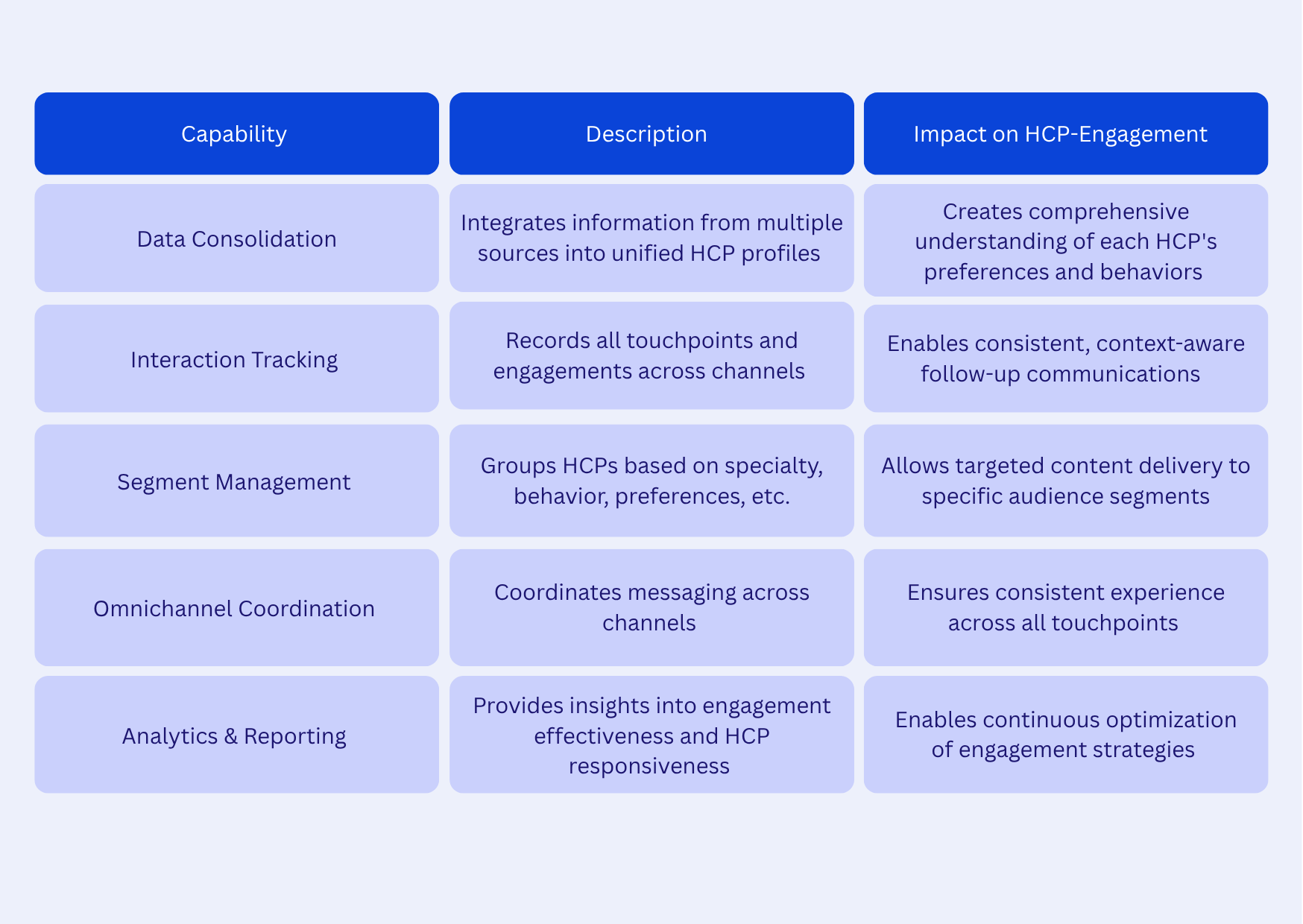The healthcare landscape is undergoing a profound transformation, driven by digital innovation and evolving expectations from healthcare professionals (HCPs). In today's information-saturated environment, where physicians may receive hundreds of messages daily from various vendors, traditional one-size-fits-all marketing approaches have become not just ineffective, but potentially counterproductive. The pandemic accelerated digital adoption, but even as face-to-face interactions return, HCPs continue to prefer personalized, relevant content delivered through their channels of choice at times that suit their demanding schedules.
Personalization as the Core of Modern Healthcare Communication
This shift toward personalized engagement isn't merely a convenience – it's a critical component of modern healthcare marketing that benefits all stakeholders. When pharmaceutical companies successfully deliver tailored content that addresses specific HCP needs, they empower healthcare professionals to make better-informed decisions, ultimately leading to improved patient outcomes. The challenge lies in executing this personalization at scale while maintaining compliance, building trust, and respecting the time constraints facing today's healthcare providers.
The solution lies in the strategic integration of Customer Relationship Management (CRM) systems with advanced artificial intelligence technologies, personalization capabilities and a steadfast commitment to data security. This powerful combination enables life sciences companies to move beyond generic messaging to create meaningful, value-added interactions with HCPs based on their individual preferences, specialties, and patient populations.
The CRM Foundation: Building Blocks for Personalized HCP Engagement
Contemporary CRM systems in the healthcare sector have evolved far beyond simple contact management databases. Today's solutions are sophisticated platforms that consolidate data from numerous touchpoints – including conferences, webinars, online interactions, surveys, and prescription patterns – to create a comprehensive 360-degree view of each HCP. This holistic perspective enables pharmaceutical companies to understand HCPs' preferences, communication needs, and information consumption habits with unprecedented clarity.
The fundamental power of CRM systems lies in their ability to segment HCPs into distinct groups based on specialty, region, prescribing habits, communication preferences, and engagement history. For instance, an oncologist requires different information compared to a general practitioner, and modern CRMs enable the delivery of relevant content to both segments simultaneously. This segmentation forms the foundation for truly personalized communication that resonates with each HCP's specific context and needs.
Key CRM Capabilities for HCP Personalization

Moving Beyond Basic Automation to Intelligent, Predictive Engagement with AI
AI has evolved from basic automation into a strategic capability that reshapes how pharmaceutical companies engage healthcare professionals. Beyond streamlining workflows, modern AI analyzes rich, multi-source data – demographics, practice focus, research activity, interaction history, and prescribing patterns – to identify high-value HCPs and deliver precision targeting that replaces scattershot outreach.
It segments audiences by real behaviors and preferences, enabling campaigns that resonate at the individual level. Just as importantly, predictive analytics anticipates needs by spotting patterns across past engagements, market signals, and emerging research, so sales reps & teams can deliver timely, relevant content that positions them as strategic partners in patient care instead of a mere vendor. Taken together, intelligent engagement and predictive insights require a robust data foundation and activation layer – with CRM systems serving as a core part of the tech stack to operationalize these capabilities at scale.
Agentic AI and Automation: The Role of Solutions Like Agentforce
Building on intelligent targeting and prediction, agentic AI (e.g., Salesforce Agentforce for Life Sciences) turns the CRM from a system of record into a system of action. Instead of merely automating tasks, these agents interpret context, reason over unified HCP data, and continuously learn – so they can choose the channel, timing, and format most likely to land. In practice, you might set up an “HCP Engagement Agent” in Agentforce that draws on real-time HCP profiles from Data Cloud and AI reasoning: For example, when an endocrinologist spends time on a dosing page, the agent drafts a short follow-up based on their recent engagement, picks the HCP’s preferred channel/time, runs it through guardrails for approval, and sends. It also updates the account info, creates a rep next-best action, and pauses generic nurture for two weeks – so the follow-up feels timely, relevant, and non-spammy.
In summary, these agents are able to leverage data and AI to orchestrate end-to-end workflows that constitute significant time savers for sales reps and account teams: triggering tailored follow-ups, surfacing new publications, suggesting next-best actions for reps, and pre-drafting materials that reflect an HCP’s specialty and prior interactions. The result is scaled personalization that feels considerate – not intrusive – freeing teams to focus on higher-value scientific dialogue and relationship building while the CRM quietly executes the playbook in the background.
The Trust Imperative: Ensuring Security, Transparency, and Reliability in AI-Driven Engagement
In pharmaceutical CRM systems, data security and compliance are not optional add-ons but fundamental requirements. Healthcare professionals entrust companies with sensitive information about their work, preferences, and interactions, and any breach of that trust can cause lasting damage to relationships and reputations. Modern CRM platforms therefore integrate security by design, using encryption, access controls, and audit trails to protect data. Some solutions, like Salesforce’s Einstein Trust Layer, even include data-masking features that shield sensitive details from AI models while still enabling useful insights. Compliance with regulations such as GDPR, HIPAA, and industry-specific rules must also be built into these systems, covering consent management, opt-out processes, and promotional restrictions. Equally important is transparency: clear explanations of how data is collected and used reassure HCPs that their privacy and professional autonomy are respected.
Ultimately, trust is built not just on security and transparency but on consistent value in every interaction. AI-enhanced CRMs support this by ensuring communications are relevant, timely, and personalized to each HCP’s needs. When follow-ups connect meaningfully to previous interactions – such as referencing a white paper an HCP downloaded and offering complementary resources – they show that the company is listening and responsive. This coordinated, thoughtful approach further helps transform pharmaceutical companies from vendors into trusted partners that genuinely support healthcare professionals in their practice.
Conclusion
The paradigm for engaging HCP has irrevocably shifted. The old model of broad, repetitive messaging is now a liability in a world that demands relevance and respect for the HCP's time and expertise. Success in this new era hinges on the ability to deliver scaled personalization – creating meaningful, one-to-one interactions that provide genuine value and build trust.
The path forward is not reliant on a single technology, but on the powerful synergy of a modern tech strategy and AI. A robust CRM system provides the essential 360-degree view of the HCP, while AI and automation transform that data into intelligent, predictive, and personalized engagement. This integrated approach ensures every communication is timely and relevant, positioning your organization as a strategic partner in patient care, not just another vendor.
Key Takeaways
Personalization is Non-Negotiable: HCPs now expect content tailored to their specialty, preferences, and patient population. Generic, one-size-fits-all marketing is ineffective and often counterproductive.
A Modern CRM is Your Strategic Foundation: A contemporary CRM is more than a database; it's the central nervous system that consolidates data, enables precise segmentation, and orchestrates consistent omnichannel experiences.
AI Drives Intelligent Engagement at Scale: Moving beyond basic automation, AI and predictive analytics anticipate HCP needs, enable precision targeting, and power agentic workflows that deliver timely, context-aware interactions without overwhelming your team.
Trust is Your Most Valuable Asset: Security, compliance, and transparency are the bedrock of successful HCP relationships. Every interaction must be built on a foundation of data protection and a clear commitment to providing consistent value.
Ready to Build Trust and Drive Results with Your HCPs?
Navigating this complex landscape requires a blend of technological expertise and strategic vision. Our team of CRM and strategy consultants is ready to help you design and implement a tailored HCP engagement program that leverages the power of CRM and AI to foster lasting, productive partnerships.
Contact us today for a complimentary consultation and discover how we can help you transform your HCP engagement strategy.







